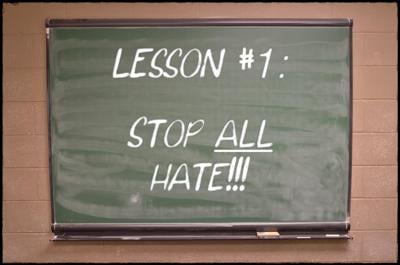President Biden will host a White House summit Sept. 15 to call attention to the rise in hate crimes in the U.S.
The United We Stand Summit will include civil rights groups, faith leaders, business executives, law enforcement, gun violence prevention advocates, former members of violent hate groups, the victims of extremist violence and other leaders.
Hate crimes are on the rise according to the latest FBI data. There were 7,100 hate crimes incidents in 2019 compared with more than 8,000 in 2020.
Around 62% of those were hate crimes based on race and ethnicity, 20% based on sexual orientation and 13% based on religion, according to the FBI. Around 2.7 % were based on gender identity, less than 1% for gender and 1.4% for disability.
Also tracking hate is the Center for the Study of Hate & Extremism at California State University, San Bernardino. They documented an almost 5 percent increase in hate crimes in the first half of 2022.
The center found in larger U.S. cities a 224% rise in anti-Asian crimes, a 41% rise in anti-Latino crimes, and a 16% rise in anti-Black crime.
Hate crimes often go unreported so the numbers are likely to be much higher than the FBI statistics.
Most states have hate crime laws but the reporting is weak. There is no uniformity across the states on what defines a hate crime. Nationally, more than 80% of nearly 15,000 local law enforcement agencies didn’t report a single hate crime to the FBI, according to a Politico analysis.
President Biden has frequently cited 2017’s white supremacist protest in Charlottesville, Virginia, as a main motive for challenging then-President Donald Trump in 2020.
“The most lethal terrorist threat to our homeland in recent years has been domestic terrorism rooted in white supremacy. We cannot ignore it. We must confront the spread of hate-fueled violence in every form,” Biden said on the four-year anniversary of Charlottesville.
The president has signed two important pieces of legislation to combat hate crimes.
In May, President Biden signed a bill making lynching a federal hate crime. The legislation is named for Emmett Till. The lynching of the 14-year-old in 1955 and his open-casket funeral helped fuel the civil rights movement. The law designates lynching as a hate crime punishable by up to 30 years in prison.
Biden also last year legislation introduced by Rep. Grace Meng, D-N.Y., and Sen. Mazie Hirono, D-Hawaii, to increase reporting of hate crimes more at the local and state levels. It authorizes grants to state and local governments to conduct crime-reduction programs to prevent and respond to hate crimes.
The summit will come at a time when hate crimes in the city of Los Angeles are at an all-time high. LA is on its way to surpassing last year’s hate crime record, according to data published last month by Crosstown at USC, a nonprofit news organization based at the USC Annenberg School of Communication and Journalism.
California has one of the most comprehensive hate crime laws that covers race, religion, ethnicity/ national origin, sexual orientation, gender, gender identity, and disability, according to the Anti-Defamation League.
California’s Civil Rights Department also is launching the ‘California vs Hate’ initiative, a resource line and network to support victims, and to increase awareness around what is a hate crime and how to report them when they occur.
Initiatives like this should help create a stronger way for victims to report hate crimes but also help inform the public.
We need stronger laws, better reporting but we also need to change the culture so there is no room for hate to grow and fester.











(0) comments
Welcome to the discussion.
Log In
Keep it Clean. Please avoid obscene, vulgar, lewd, racist or sexually-oriented language.
PLEASE TURN OFF YOUR CAPS LOCK.
Don't Threaten. Threats of harming another person will not be tolerated.
Be Truthful. Don't knowingly lie about anyone or anything.
Be Nice. No racism, sexism or any sort of -ism that is degrading to another person.
Be Proactive. Use the 'Report' link on each comment to let us know of abusive posts.
Share with Us. We'd love to hear eyewitness accounts, the history behind an article.